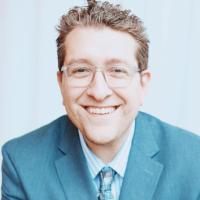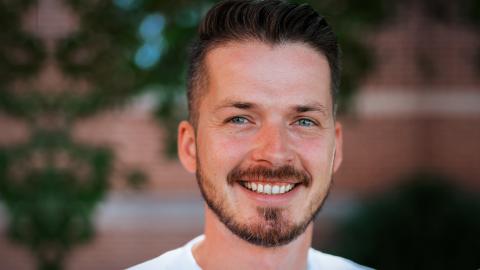
'Shut Up, Devil': Are Too Many Churches Ignoring Evil? Meet the Bible Teacher on a Mission to Reignite the Conversation
In Ephesians 6, the Apostle Paul implores Christians to dress themselves in the “full armor of God” to “stand against the devil’s schemes.”
He illustrates a vivid spiritual battle in which humans must acknowledge the existence of “spiritual forces of evil in the heavenly realm.” But what does that look like, why does it matter, and how does one triumph in such a war?
Listen to the latest episode of the Faithwire podcast:
These are particularly pertinent questions in a world in which the topic of evil is often overlooked, downplayed, or ignored, even in some Christian churches. It’s a dynamic that troubles Bible teacher Kyle Winkler, who addresses these very subjects in his new book “Shut Up, Devil.”
Winkler, who breaks down in the book the “enemy’s secret tactics” and provides Bible-based advice for overcoming evil, shared his experience and the pushback he sometimes gets within the church while discussing these issues.
“In some ways, I think the world gets it more than some people in the church,” he recently told “The Playing With Fire Podcast.” “I’ve gotten more flak, I think, from some people in the church … ‘Why are you always talking about the devil so much?’”
Listen to Winkler break down how he believes people can silence the devil:
Winkler said Christians shouldn’t “obsess about the devil” but contends believers must be aware, on guard, and defend themselves, especially in light of Scripture’s warnings.
“The Bible does talk a lot about him, and definitely one of the key Scriptures that I reference is , where it says, ‘Stay alert, watch out for your great enemy, the devil. He prowls around,’” Winkler said. “It’s one of the great deceptions: If the enemy can convince people that he doesn’t exist at all, and that is where, sadly, a lot of people in the church culture are today.”
He said the endless quest for positive messages can sometimes eclipse discussions about evil, as people come to “throw the baby out with the bathwater” and avoid conversations about Satan altogether.
“I tell people the most positive message isn’t the denial of evil; it’s the defeat of evil,” he said. “The devil is a sneaky but defeated foe. We don’t need to obsess about him but talking about him isn’t [obsessing].”
Winkler dove into this topic a few years back with the launch of his Shut Up, Devil app, a tool with more than 250,000 downloads — and counting. He said the app was created after battles with his own insecurities held him back in life.
At the time, Winker was employed by a large church, had a master’s of divinity and biblical studies, and had been a firm believer for a decade. Yet he still felt some of the same fears and anxieties he had before embracing Christ.
“[I had] a lot of the insecurities and mind games that I battled well after I was a Christian — in some ways, more after I was a Christian than before I was a Christian,” he said. “But I would take Scriptures related to things that I was facing to confront the mind games and the lies with truth.”
Winker said he had tragically come to embrace some of the enemy’s lies, believing he didn’t belong, he would never be loved, and that God would punish him. And these lies persisted even after he found Jesus. He had to come to a place of renewing his mind based on biblical truth to escape the fallout.
“I was trying to work my way to achieve God’s acceptance and God’s love and things like that,” he said. “And that was just this cycle of up and ups and downs.”
Eventually, he was able to overcome that dynamic. Now, he’s hoping to help others. Winkler said the name for the “Shut Up, Devil” book – and the homonymous app — originated from biblical truth.
He specifically pointed to Jesus’ 40 days in the desert and Christ’s interactions with Satan. Those familiar with the biblical account know, at the end of the devil’s failed attempts to tempt Jesus, Christ proclaimed, “Away from me, Satan!” This sentiment had a profound impact on Winkler.
“But what does Scripture do to the lies? What does Scripture or truth do to the devil?” he asked. “It shuts him up just like Jesus did in the wilderness … when the enemy came after Him, questioning Him. He used the truth of God’s Word to say, ‘Shut up, devil.’ So that’s really where it came from.”
Winkler wants to equip Christians to push back against the devil’s lies — mistruths that can separate people from the Lord. Rooting oneself in Scripture helps Christians better ignore the enemy’s lies.
“Some of what [Satan] says can be scary, but it really has no merit. It can’t really do anything to you except maybe to convince you of lies,” Winkler said. “That’s really the enemy’s only power, and that’s why I also call it, ‘Shut up, Devil.’”
In the end, Winker said it’s all about “dismissing” Satan’s influence over one’s life.
“That’s what this is all about. It’s really saying, ‘No, you’ve been defeated in my life because of Christ. I am in Christ. So, therefore you don’t have a place to talk to me,’” he said.
Winkler also addressed a plethora of additional issues, including deliverance and the differences some Christians hold regarding the theology of evil. Listen to the “Playing With Fire Podcast” episode here for the entire discussion.
***As the number of voices facing big-tech censorship continues to grow, please sign up for Faithwire’s daily newsletter and download the CBN News app to stay up-to-date with the latest news from a distinctly Christian perspective.***




